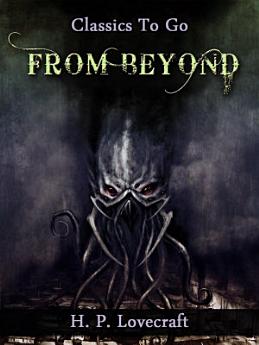From Beyond
Nov 2017 · Otbebookpublishing
E-Book
19
Seiten
family_home
Zulässig
info
reportBewertungen und Rezensionen werden nicht geprüft Weitere Informationen
Über dieses E-Book
From Beyond is a short story by science fiction and horror fiction writer H. P. Lovecraft. It was written in 1920 and was first published in The Fantasy Fan in June 1934 (Vol. 1, No. 10). The story is told from the first person perspective of an unnamed narrator and details his experiences with a scientist named Crawford Tillinghast. Tillinghast creates an electronic device that emits a resonance wave, which stimulates an affected person's pineal gland, thereby allowing them to perceive planes of existence outside the scope of accepted reality. (Goodreads)
Autoren-Profil
H. P. Lovecraft, born Howard Phillips Lovecraft on August 20, 1890, in Providence, Rhode Island, is a towering figure in the realm of weird fiction and horror literature. Despite facing economic hardships and personal struggles, Lovecraft's prolific writing has left an indelible mark on the genre. His works, characterized by their intricate mythologies and cosmic horror, delve into the insignificance of humanity in the vast, indifferent universe. Lovecraft's creation of the Cthulhu Mythos, a pantheon of ancient, god-like beings, has inspired countless authors, filmmakers, and artists, cementing his legacy as a pioneer of modern horror. His influence extends to contemporary writers such as Stephen King, Neil Gaiman, and Guillermo del Toro, all of whom have acknowledged Lovecraft's impact on their work.However, Lovecraft's legacy is not without controversy. His xenophobic and racist views, evident in both his personal correspondence and some of his writings, have sparked significant debate and criticism. Modern readers grapple with the duality of his contributions to literature and the problematic aspects of his worldview.Despite these contentious elements, Lovecraft's revolutionary ideas about the unknown and the unknowable continue to captivate audiences. His ability to evoke a sense of dread and wonder through his unique blend of science fiction and horror ensures that his work remains relevant and influential in the 21st century. Lovecraft passed away on March 15, 1937, but his cosmic horrors live on, haunting the imaginations of readers worldwide.
Dieses E-Book bewerten
Deine Meinung ist gefragt!
Informationen zum Lesen
Smartphones und Tablets
Nachdem du die Google Play Bücher App für Android und iPad/iPhone installiert hast, wird diese automatisch mit deinem Konto synchronisiert, sodass du auch unterwegs online und offline lesen kannst.
Laptops und Computer
Im Webbrowser auf deinem Computer kannst du dir Hörbucher anhören, die du bei Google Play gekauft hast.
E-Reader und andere Geräte
Wenn du Bücher auf E-Ink-Geräten lesen möchtest, beispielsweise auf einem Kobo eReader, lade eine Datei herunter und übertrage sie auf dein Gerät. Eine ausführliche Anleitung zum Übertragen der Dateien auf unterstützte E-Reader findest du in der Hilfe.








